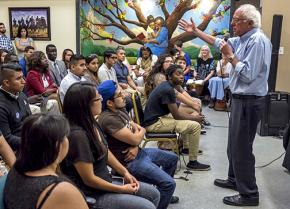The kernel of the Sanders campaign
Author responds to an article by Tom Hayden that ends up by urging unity between supporters of Hillary Clinton and Bernie Sanders.
IN AN interesting recent article reproduced at Portside, Tom Hayden has made an extremely important point:
There is no doubt that the Bernie generation is our political future, joining with groups demanding living wages or $15/hr, Black Lives Matter, the Dreamers, and 350.org. With their roots in the Occupy movement, they are viscerally mad at the rigged economy based on McJobs and the monopoly power of the plutocrats.
They want a lifting of student debt and lowering of tuition, the expansion of health care. [Eighty percent] of millennials demand a transition to clean energy and renewables by 2030. 82 percent want background checks on all gun purchases. They want Citizens United repealed and secret money unmasked. Bernie has raised an astounding $41 million dollars, 74 percent in small individual contributions.
I find the rest of the article highly problematic, but this paragraph is luminous. It highlights the role that the Sanders campaign has played in helping to draw millions of people toward what is basically a socialist agenda, helping to clarify key class issues underlying that agenda and mobilizing many of those millions to try to do something about it--reinforcing an activist mindset and nurturing a socialist consciousness among many who may not have been quite at that place before.

Of course, Sanders himself is hardly a revolutionary socialist, and some of his positions reflect that. It is unfortunate that sometimes when defining his "democratic socialism," Sanders has not emphasized that socialism means rule by the people over the economy--what Eugene V. Debs explained as an economy owned by society and democratically controlled to guarantee a decent life for all, a society of the free and the equal.
Instead, he has described it as being similar to Franklin D. Roosevelt's New Deal policies and Scandinavia's welfare-state capitalism. Despite this limitation, the vocabulary and logic of the Sanders campaign has had the profound impact that Hayden points to.
HAYDEN WAS a founder of Students for a Democratic Society (SDS), key author of the eloquent "Port Huron Statement" in 1962, and a participant and sometimes central organizer in a number of struggles for peace, justice and social change. For most of his life, he has also been a steadfast partisan of left-wing activists working inside the Democratic Party and voting--whenever "necessary"--for the lesser evil.
In this particular article, Hayden's primary concern is that the primary fight between Sanders and Clinton-–in which Clinton openly defends capitalism and trashes Sanders in the all-important struggle for the presidential nomination--not be allowed to alienate Sanders' impassioned and massive base from helping to elect Clinton in November.
Some of the supporters of the Sanders campaign, although they genuinely desire the political revolution that Sanders has talked about, may well be persuaded by Hayden and others to end up campaigning for Clinton. But she represents the "liberal" wing of the political counterrevolution.
Electing such people never solves the terrible problems and underlying crises that afflict our society-–and as people become hurt and angry and fearful, they turn elsewhere for solutions. If there is no strong, uncompromising pole of genuine democracy and socialism, the pathway is increasingly cleared for a turn to representatives of the reactionary wing of the political counterrevolution.
Some Sanders supporters will not do what Hayden urges. They are the hope of our future--particularly those who do not despair, who do not give up and who continue to struggle for the various interrelated goals that are part of the socialist agenda.
If it will take an actual revolution to bring about this agenda-–if it will mean that the power of the 1 Percent over our economy and politics must be broken and replaced by the power of the 99 Percent--this saving remnant (hopefully very substantial in numbers and energy and commitment) will become a force to help make this so.


